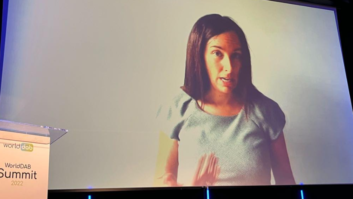The author is co-founder and general manager of WSUM(FM), located on the University of Wisconsin-Madison campus.

Dave Black Most, if not all, of us have been to conferences, workshops and seminars where the topic of “millennials” (those born between 1983 and 2010) has been addressed at great length, generally by way of a lecture of some sort, with PowerPoint slides citing data indicating that today’s generation of college students is the laziest, least motivated, least socialized and most self-involved generation the Earth has ever seen.
My experience with the current generation of undergraduate college students is quite different, however.
I’m telling you that there is great hope going forward. Here are the reasons I think we can be optimistic in broadcast, as we face mass retirements of baby boomers and an influx of millennials now and over the next two decades or so.
The technology in the home today removes a barrier between the imagination and the creation of media.
When I was a kid (I am a Boomer), my brother and I would play “Huntley and Brinkley” by drawing the NBC logo on the blank bottom of the box of some game we had received the previous Christmas. We set up simulated microphones, banged out scripts on the two-ton trusty old Royal typewriter my parents had purchased in 1946 or so.
Using the Columbus method of typing (discover a key and land on it), we would put “news” to paper and let our imagination do the rest.
As treasured as those memories are, contrast that with what students today can do, with miniature HD video cameras in their personal cell phones, complete with high-tech mic and digital storage. Desktop computers, laptops and tablets are easily loaded with sophisticated, yet easy-to-use, editing programs. We’ve got YouTube and other platforms upon which to load the finished product for fun and feedback.
There are fewer barriers for today’s generation of students. They are at the time of life in which learning is most efficient, easiest and most likely to take place. They are entering the market at a time when high-priced talent is exiting and at a time in our country when economics dictate bringing on low-priced talent (e.g., young, inexperienced people).
A GENERATION OF SELF-STARTERS
For all of us in this “bottom line” business of broadcast media, here’s the bottom line: Students today are much more technologically savvy than we were at their age, and more importantly, they’re more sure of themselves and their ability to succeed in the broadcast world (by and large) than previous generations.
This will translate into (and we are seeing this already in our graduates) hard-working, capable, entry-level broadcasters, sales people and leaders who maintain their enthusiasm beyond the first couple of weeks on the job.
This fear I hear expressed so often by professionals in a position to hire new talent is that the concepts of “sharing,” “team” and “selflessness” are foreign to millennials.
The answer to this fear, which I would like you to consider, is two-fold:
Broadcast media personnel are constantly changing stations, ownership and leadership. It is a business made for professionals who are loyal to the business and the employer, but not necessarily to the point of being a “team” in the same sense as a church or surgical unit at a hospital or school administration or you fill in the blank.
The commercial (and even noncommercial) stations I worked for in the 1980s and ’90s worked best when we were doing our jobs independently, with strong deadlines and little hand-holding.
“Self-starters” is the way I see it phrased in the classified ads. I don’t think that has changed much, and I would argue that the generation of students we are seeing now are much more suited to that approach than Gen-X or baby boomers.
As far as any data I can provide, it is anecdotal and qualitative:
I have an unbelievably strong class of juniors who have been running our station for about a year. They meet once a week to share what they are doing, to get some feedback from their student station manager and me, and then they continue on a path of accomplishment that we set for them individually at the beginning of the semester.
We had our most productive summer ever last year.
Two freshmen, who are likely to become station leaders in their sophomore year and beyond, have already set an ambitious (but eminently doable) blueprint for success in their broadcast area (sports and general programming).
What I am struck by most is that there seems, generally, to be less anxiety about creating a plan and executing it than we have seen here at WSUM(FM) in the last 15 years or so.
Keep in mind that we are almost always dealing with incredibly smart overachievers. This generation of “DIY” (do it yourself) students seem to not see barriers to accomplishing great things in the broadcast world. It all seems possible to them rather than “pie in the sky.” That alone is worth taking a chance on.
One caution to share with you would be that young people generally tend to respond to criticism better if it is delivered calmly with plenty of specifics. I suppose we are all that way. We try to practice the methods of Stephen Covey (author of “The Seven Habits of Highly Effective People”) and the “strengths” movement (based on Gallup data) in coaching the students to success.
Ultimately, though, it comes down to the quality of the person, and I see very high-quality people here; perhaps the highest quality college student there has been in the world. (Two of our best May 2012 graduates are plying their trade at WXOW and WKBT television stations in LaCrosse, Wis.).
That’s a prospect that will surely cheer any broadcast owner/general manager’s heart.
It’s also a testament that we can count on these millennials to keep our business moving forward and upward into the 21st century and to strongly influence the succeeding generations in a very positive way.











